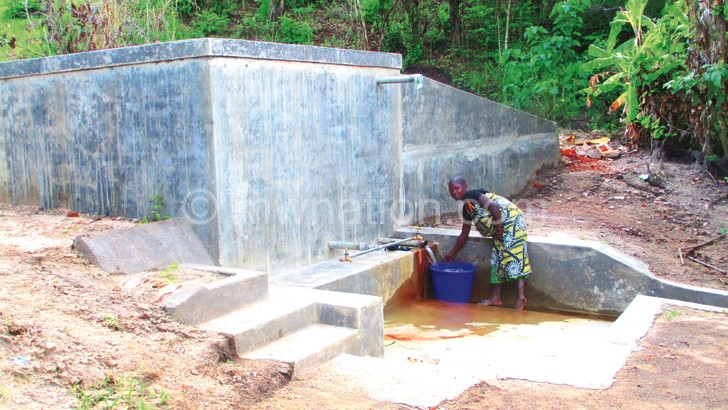Water in Vunganthenda’s eyes
The cleanest water gush in a mountaintop population’s history waters neglected calls for an end to exclusion. JAMES CHAVULA writes.
In Karonga south, ‘vunganthenda’ means keeper of diseases. Here, a deserted village in Traditional Authority (T/A) Wasambo has long lived up to its name.

“People get sick, often due to unsafe water,” says Group Village Head (GVH) Vunganthenda.
To the traditional leader, it is not shocking that the cut-off community has been scrambling for water from the same spring as livestock and wild animals.
Actually, it spectacularly sums up exclusion facing nearly 175 households in his hilltop setting.
An island in the sky, Vunganthenda nests on a range that offers postcard views of Nyika National Park and Lake Malawi. However, only visitors tell epic tales of the distant tourism attractions.
The residents rue being born in the locality. All roads to the village are nearly impassable. Both visitors and residents stumble up and down the slopes with a blurred, narrow rocky way with stumps all over.
A Red Cross Society of Malawi (RCSM) driver brags of being probably the first motorist to get to Vunganthenda, recalling: “The whole village thundered into songs of praise, but the hero’s welcome reached a fervent pitch when the GVH unleashed a homemade gun and fired in the air two times.”
The former driver of former Karonga South member of Parliament (MP) Chembe Munthali might not have received the three-gun salute in 2013, but says: “Being the first and most prominent politician to step in the hard-to-reach area won him nearly all votes at the polling station.”
Presently, Vunganthenda villagers say it is shocking they have been abandoned to live like wild animals as basic amenities are almost unavailable.
Amid the ruinous impact of poor access to clean water, there is no hospital across the tricky slopes. The locals endure a 17-kilometre walk to Lwezga Health Centre, spending nearly four hours surmounting hills and valleys. Children endure lengthy walks to a school many teachers shun in preference for urban settings. The pupils increasingly quit school, compounding illiteracy, poverty, child marriages and teen pregnancies.
Policy makers chant ‘water is life’, but the far-flung minority of Vunganthenda and neighbouring Mwaphoka had been sharing a well with hyenas, snakes, birds, monkeys and other game from the nearby national park until Red Cross intervened by protecting the natural spring with a concrete wall.
During the visit, Margret Kumwenda, 33, spoke of “taps” in reference to the concrete affairs with water gushing from protruding pipes.
“We don’t just admire the water in the lake. We have plenty of water here. But the major challenge was it was not as clean as the potable water from the taps,” says Kumwenda.
The cut-off population now has a taste of the safest water drops in history, she said.
The cement walls safeguard the famous spring from unwanted human activity and animals.
Inadequate investment in elimination of gaps that marginalise hard-to-reach populations is one of the factors Millennium Development Goal (MDG) assessments show almost 20 out of 100 Malawians have no access to potable water this year.
Vunganthenda and Mwaphoka residents find it amazing that they have not been wiped out by cholera, but they say diarrhoea and dysentery were widespread.
“The disease burden is lessening. Children no longer miss classes because of waterborne illnesses,” says Kumwenda.
Red Cross is a voluntary aid society, established by an Act of Parliament to alleviate human suffering, especially in times of war, disease outbreaks and other disasters. Tackling prevailing risk factors effectively prevents humanitarian crises and potential hardship.
Gloria Kunyenga, manager for Red Cross community-led healthcare programme in Karonga, says access to water is a rights and public health issue regardless of where people live.
Since 2013, the Danish Red Cross has bankrolled the drilling of 17 boreholes and repairs of 32 in T/A Wasambo, south of Karonga. Seven new ones are on the cards.
“We couldn’t drill boreholes at Vunganthenda and Mwaphoka because of its tricky terrain. It is mountainous and the roads nearly impassable. Protecting the spring was the most effective way,” says Kunyenga.
Red Cross is also rallying the households to build and use pit latrines.
With no other organisation operating in the hilly terrain, the secluded Malawians feel forsaken. Even local phone networks are out-powered by spills from Tanzania and Zambia. More needs to be done, says the GVH.
“The provision of water and sanitation must mark the beginning of life-changing interventions. Vunganthenda cries for a proper road, school, health centre, market and so much more,” he says. n





